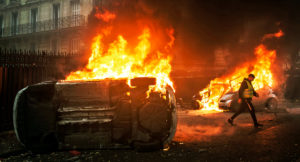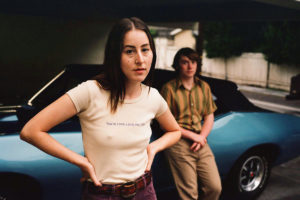In Michel Houellebecq’s startlingly long new novel, the 735-page Anéantir, our Everyman protagonist Paul Raison is returned by family illness to his childhood bedroom. There, in typical Houellbecqian fashion, he jabs us with a completely heterodox, completely confident provocation: Matrix Revolutions (2003) is the true masterpiece of the series. That third instalment may be, Paul knows, less innovative than the first; but in it, Paul believes the love story between Trinity and Neo — which had been a little awkward in such a “film de nerds” — becomes truly moving, “réellement boulversante”.
What should we make of this three-page tangent, one that neither develops into a real argument nor develops any real consequences for any of the novel’s admittedly smudgy plot-lines? Perhaps Houellebecq sees a parallel of his own oeuvre in that of the Wachowskis’: between the decade-defining original Matrix (1999) and the Molotov cocktail Houellebecq threw with his Nineties debuts, Extension du domaine de la lutte (1994) and Les particules élémentaries (1998).
Those first two novels were literary sensations, mixing fire-tongued dissection of l’après-68 with science fiction, evoking the dead-end of the everyday and imaging the dead-end of the species. On the newest tome, critics have been more divided.
They agree, however, that with this one, there’s a newer, calmer, more optimistic Houellebecq: finally, “Houellebecq makes room for love”. With this clumsy ode to the least philosophical Matrix, is Houellebecq perhaps telling us that though it might not look like it, this novel — this sentimental, mushy-penned final novel — is his true masterpiece?
He seems to believe so. As he told Le Monde, “contrary to what a famous formula claims, I think that it is with good feelings that we make good literature”. The murderous misogynists of his earlier books are gone, replaced with a pretty reasonable technocrat who’s nice to his wife (Paul “Raison” — clever!). Indeed, most of the characters are pretty nice. That’s by design: as Houellebecq continued, “the ultimate achievement would be if there were no bad guys at all!”
How can this be the Houellebecq we know and love, the Houellebecq who complained that female readers found it “difficult to accept pure negativity”?
Houellebecq has never been known as the greatest of stylists or the fairest of psychologists. When I studied him for an aborted PhD, there were, of course, the requisite titters: he was sexist, he was racist, and what’s more, he was populaire. It’s clear that Houellebecq is an important writer — the most interesting, the most provocative, the most of our time, for better or worse.
Fan as I am, though, his “badness” occasionally frustrated me: could it escape Houellebecq’s attention, I wondered as I read, say, La Possibilité d’une île (2005), that it’s a little unconvincing for a perfectly harmonious couple to calmly and spontaneously dissolve at the very first appearance of ageing on the wife’s previously perfect body?
I don’t know. But now, annihilated by Houellebecq’s 735-page attempt at a less Manichaeian narrative, I mourn the venom. I mourn the badness. I mourn the bad guys.
In the acknowledgments of Anéantir, Houellebecq announces that this will be his last novel. As the title predicts, of course, this is a novel about annihilation. Radical ecologists are attacking Europe, targeting immigrants and artificial reproduction, the only bulwark against the population collapse of the West. Paul’s father is dying. Paul, ultimately, dies. And Houellebecq writes his last book.
On such an occasion, with this strange and sentimental swan song, should we recall what made Houellebecq so wonderful? In a recent defence of Anéantir published in The Spectator, Houellebecq is compared with Balzac, in both his “comparable ambition” and his “tireless work”. This is, of course, familiar to any reader of Houellebecq; not only has he ceaselessly praised Balzac for two decades, but his novels have been peppered with allusions to him.
But Balzac’s ambition wasn’t primarily the psychological complexity of individual characters: his devouring ambition, the one that kept him writing for 15-hour days, on 50 cups of coffee, was to write the complete Comédie humaine of France, the one that would depict in narrative, like a map in lines, French reality from the Restoration to the July Monarchy. These 91 novels, furiously written by a man who had tried to be a respectable, bourgeois lawyer, and ended up wearing Middle Eastern robes and writing through chronic illness, are a capsule of a time of dizzying social and economic change. They are not about people; they are about people in a society. Many of his novels, indeed, were designated “studies”.
So, too, in Houellebecq: like his hero, he gives his characters, at his best, birthplaces, birthdates, and parents. Like his hero, he has an encyclopaedic bent, a desire to explain, a will to knowledge. Like his hero, he wants to understand what on Earth is going on. The laziest critics of Houellebecq dismiss him as a novelist of the patriarchal white male, who doesn’t “recognise that it is societal structures such as poverty, racism, colonialism and inequality that are the source of men’s suffering”. But this is precisely where Houellebecq succeeds: he does recognise that society is making us miserable.
That’s what is so special about him today. Almost no modern writer seems interested in the society we live in. Here in America, at least, there’s plenty of slumming-it, reheated-Carver poverty porn and box-checking census-opera; but ultimately, these currents are more cynical attempts to avoid criticism than criticism themselves.
As literature has become an increasingly hard way to make a living, aspiring writers would do best to be born wealthy. Otherwise, they might choose to write Young Adult fiction (far more lucrative than grown-up fiction, and therefore dominant). Or they might choose to take a creative writing program; on this workshop-based path, the entire incentive structure is a risk-averse one aimed at pleasing one’s elders and avoiding attention from one’s peers. Under these conditions, whoever is writing literature is a coddled rich kid and/or person who has largely interacted with the sorts of individuals who can tolerate creative writing workshops. The longer they stay in this bell jar, the less and less they know about what society even is.
Houellebecq, of course, wins here. Balzac was a would-be lawyer, Flaubert was a would-be lawyer, every writer on the “recommended” table at my local bookstore is a graduate of one of 12 college prep schools. But Houellebecq was a computer programmer: a code monkey, a cubicle rat. And so when Extension du domaine de la lutte came out — a novel about a programmer so miserable he drives his hideous virgin colleague to suicide — it was a cri de coeur for an entire, degraded society. It was catharsis.
In La Nausée (1938), Houellebecq’s clear predecessor Sartre evoked a man in existential crisis, in a world without God in which the structures of city, family, and religion no longer have any transcendental meaning. In Houellebecq’s novels, there is nausea enough: the first act of a Houellebecqian hero is to vomit in the middle of an office party, at the end of the first chapter of Extension. But the despair has reached the point of near-numbness, and God is no longer a real possibility (even if a Muslim takeover of the Sorbonne, as in Soumission, is).
In Sartre, the structures have become meaningless; in Houellebecq, they have ceased to exist. The frames that gave comfort, stability, and meaning to life have been destroyed in the name of freedom. To borrow Houellebecq’s description of this novel’s miserable couple, we live in “une sorte de désespoir standardisé”. Miserable white-collar Everyman that he is, he wonders why.
Houellebecq was not, of course, the first person to criticise 1968. Foucault denounced sexual liberation (though this seems to elude many of his most enthusiastic advocates); so did Michel Clouscard; even Marcuse himself admitted that the sexual revolution had been coopted by consumerism. But Houellebecq’s critique of sexual liberation wasn’t theoretical; it wasn’t a Semiotext(e) book, and you didn’t have to know Hegel, and you didn’t have to take notes.
You read those books, and you recognised it: how it felt to shop alone and read the over-enthusiastic copywriting on a pre-made meal for one; how it felt to feel that every conversation you had with a work colleague was an excruciating effort to appear happy and convivial with a terrifying alien; how it felt to feel like the basic elements of life you had been promised — a more or less kind spouse who loved you, a child, a little home you could plant bushes in front of — were merely plot points in silly tales for little kids.
And, importantly, he talked about feeling ugly: a surprisingly rare topic. For Houellebecq, the modern environment is one of sterility and predictability, punctuated by occasional violence; it is one of quiet humiliations wrapped in consumer packaging; it is one of forced enjoyment and unbelievable exhaustion.
Houellebecq’s novels are so tantalising because they actually analyse our dysfunction. As was the subject of Sérotonine (2019), we live in a society in which a schizophrenic mixture of chemical determinism and trauma discourse has turned almost every feeling into an aggressively-treated and individual one. We have developed a world in which antidepressants — and, often, both amphetamines and anti-anxiety medication — are considered a completely normal, almost essential, supplement. This is, obviously, a nightmare. And some people, occasionally, want an alternative.
That’s why we need Houellebecq’s pauvres types. That’s why they need to be miserable. That’s why they need to be completely out of their minds. Houellebecq has never been a great psychologist; he has never been a great stylist. But his mal du siècle is more sickening than anybody else’s, and his analytical drive is, at its best, in a league of its own. Other writers of bureaucratic hell (see Halle Butler) don’t have Houellebecq’s Balzacian side, which is his triumph: he hates everything, and yet he wants to understand why. He persists, even though critical thought itself has come to seem obsolete. As his stand-in in La Possibilité d’une île, a controversial comedian, reflects, “I was, indeed, a cutting observer of contemporary reality; it was just that everything now seemed so elementary to me, it seemed that so few things remained that could be observed in contemporary reality.”
Bewilderingly, much of that has disappeared in this last volume. It’s far too long, and shockingly boring; entire transcribed conversations serve virtually no purpose, and every scene starts earlier and ends later than it should, as though he wrote the book on stimulants or perhaps under hypnosis. Maybe Houellebecq’s editor (accurately enough) figured it wasn’t that important to edit. Or maybe Houellebecq is the victim of his own success: his early books are so iconically masterful at capturing the malaise of a pleasure-driven and unpleasant society that even his clever observations seem a little old hat. As Houellebecq himself recognised, “in opening my literature to theoretical conceptions one might develop about the world, I am constantly vulnerable to cliché and, in truth, I’m doomed, my only chance at originality consisting of (to borrow Baudelaire’s intuition) developing new clichés.”
There are highlights; I teared up towards the end, when Paul’s wife gets emotional remembering when the two of them were teenagers, going through the loneliest period of their lives, and hadn’t yet met. As the protagonist of Extension whispers to his coworker, as the protagonist of Particules tells us, we are haunted by the teenage loves we didn’t have. And how sad to have wanted, at death’s door, to have been there.
All told, this much-noted turn to love leaves much to be satisfied: essentially, the protagonist and his wife, two énarque bureaucrats, have not been sleeping together, but she develops a mild interest in paganism and therefore feels a little more feminine and since her ass is still firm, then they do. Once he is dying of cancer she starts wearing thongs.
The same goes for the other plots. The political one is so predictable in its observations — yes, Macron is like a made-for-TV president; yes, the Right is popular in France; yes, cyberterrorism is a threat — that it seems almost AI-generated. The protagonist’s father is in a coma, and while Houellebecq does not support euthanasia, this parental loss somehow carries almost no emotional weight.
The protagonist’s brother is married to a journalist, and she is very annoying and evil. The protagonist’s sister is very Catholic and not evil at all, her husband is poor, she has a black son, and at one point her daughter inadvertently gives the protagonist fellatio. But somehow, every plot simply fizzles out to leave us to contemplate the character’s relatively sudden cancer diagnosis. On the one hand, that diagnosis elicits the very fine observation that modern life revolves around the dissimulation of “l’agonie”; but on the other hand, even this death plot falls into elegies to knickers and blowjobs.
Perhaps Houellebecq, in his novel about two men declining through no fault of their own (unlike, say, the wheelchair-bound swinger of Particules), couldn’t bear to go into full-on nihilism. Perhaps it seemed too dark to have these men die in sadness, without meaning, without redemption, to say their lives had ceased to have meaning long before their strokes or cancers.
In its breathless review, Le Monde said that “one feels, above all, that his writing seeks more than ever to fuel, if not hope, at least values”. But what values? Our hero observes that his Catholic sister seems happy, but he still can’t believe; he observes that politicians should have real values, almost like kings, but no such hero arrives.
Ultimately, the only real lesson is to try to have sex with your wife again before you die, which thankfully seems pretty simple. So, sure, this book’s less dark. But having turned on the lights, there’s not much to see: annihilation, indeed.
Disclaimer
Some of the posts we share are controversial and we do not necessarily agree with them in the whole extend. Sometimes we agree with the content or part of it but we do not agree with the narration or language. Nevertheless we find them somehow interesting, valuable and/or informative or we share them, because we strongly believe in freedom of speech, free press and journalism. We strongly encourage you to have a critical approach to all the content, do your own research and analysis to build your own opinion.
We would be glad to have your feedback.
Source: UnHerd Read the original article here: https://unherd.com




